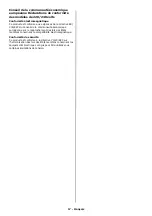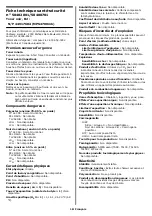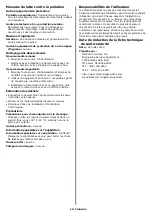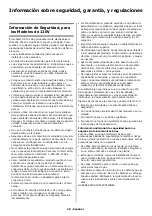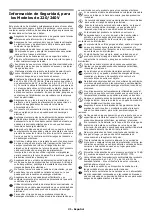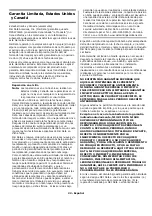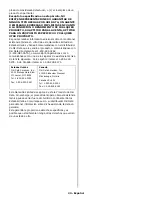
8 - English
Material Safety Data Sheet
#
58402801/58408701
Black Toner, Type B2:
P/N 44917604 (MPS4700mb)
For more information, contact Oki Data at: 2000 Bishops
Gate Boulevard, Mount Laurel, NJ 08054-4620.
Emergency Information
: call 1-800-654-3282; US and
Canada only.
Emergency First Aid Procedures
Toner inhaled.
Remove person to fresh air. Seek medical attention.
Toner swallowed (ingested)
Immediately seek medical attention. Never give
anything by mouth to an unconscious person. If
possible, rinse out mouth and give one or two glasses
of water or milk to drink.
Toner gets in the eyes.
Flush eyes with large quantities of cool water for 15
minutes, keeping the eyelids open with fingers. If
necessary, seek medical attention.
Toner gets on the skin.
Wash toner off the skin with plenty of cool water and
soap. If necessary, seek medical attention.
Note:
Small amounts of toner on skin or clothing can
easily be removed with soap and
cold
water. Hot
water makes toner harder to remove.
Hazardous Ingredients
Polyester (about 70-95% by weight)
CAS#: Trade Secret.
OSHA TWA: Not established.
ACGIH TLV: Not established.
LD
50
: Not available.
LC
50
: Not available.
Carbon Black (about 2-6% by weight)
CAS#: Trade Secret.
OSHA TWA: Not established.
ACGIH TLV: Not established.
LD
50
: Not available.
LC
50
: Not available.
Silica dioxide (about 1-5% by weight)
CAS#: Trade Secret.
OSHA TWA: Not established.
ACGIH TLV: Not established.
LD
50
: Not available.
LC
50
: Not available.
Physical Data
Physical State:
Solid.
Melting/Freezing Point:
Not available.
Boiling Point:
Not available.
PH:
Not available.
Vapor Pressure:
Not available.
Vapor Density (Air=1):
Not available.
Evaporation Rate (Butyl Acetate=1):
Not available.
Specific Gravity (H
2
O=1):
1.1 to 1.2 at 20°C (68°F).
Solubility in Water:
Not available.
Solubility in Solvents:
Some components are soluble
in toluene, chloroform and tetrahydrofuran.
Coefficient of water/oil Distribution:
Not available.
Appearance and Odor:
Black powder, no odor.
Odor Threshold:
Not available.
Fire and Explosion Hazard Data
Minimal fire hazard. Large quantities may cause risk of
dust explosion.
Flash Point (Method Used):
Not available.
Flammable Limits
Lower Explosive Limit:
Not available.
Upper Explosive Limit:
Not available.
Auto-Ignition Temperature
: Not available.
Explosion Data
Sensitivity to Mechanical Impact:
Not available.
Sensitivity to Static Discharge:
Not available.
Extinguishing Media:
In case of small fire, use CO
2
.
In case of large fire, shut off air by spraying with
water or foam.
Special Fire Fighting Procedures:
Fight fire from
upwind position. Avoid inhalation of smoke or gases.
Wear self-contained breathing apparatus.
Hazardous Combustion Products:
Not available.
Toxicological Properties
Routes of Entry:
Inhalation, Ingestion, Eyes, Skin.
Effects of Acute Exposure:
Not available.
Effects of Chronic Exposure:
Not available.
Exposure Limits:
Not available.
Irritancy:
Not available.
Sensitivity:
Not available.
Carcinogenicity
IARC
Silica Dioxide: Group 3, "Not classifiable."
Carbon Black: Group 2B, "Possible Carcinogen."
NTP:
No components are listed.
OSHA:
No components are listed.
Reproductive Toxicity:
Not available.
Teratogenicity:
Not available.
Mutagenicity:
AMES test (TA98, TA100, TA1535,
TA1537, WP2uvrA)
Name of Toxicoligically Synergistic Products:
Not
available.
Reactivity Data
Stability:
Stable in general.
Conditions to Avoid:
Avoid excess heat and all
sources of ignition.
Polymerization:
Will not occur.
Hazardous Decomposition or Byproducts:
Combustion products include harmful gases such as
carbon monoxide and nitrogen oxides.
Incompatibility:
Not available.
Preventive Measures
Personal Protective Equipment
Respiratory Protection:
Not normally required. For
large spills, use dust respirator during cleanup.

















